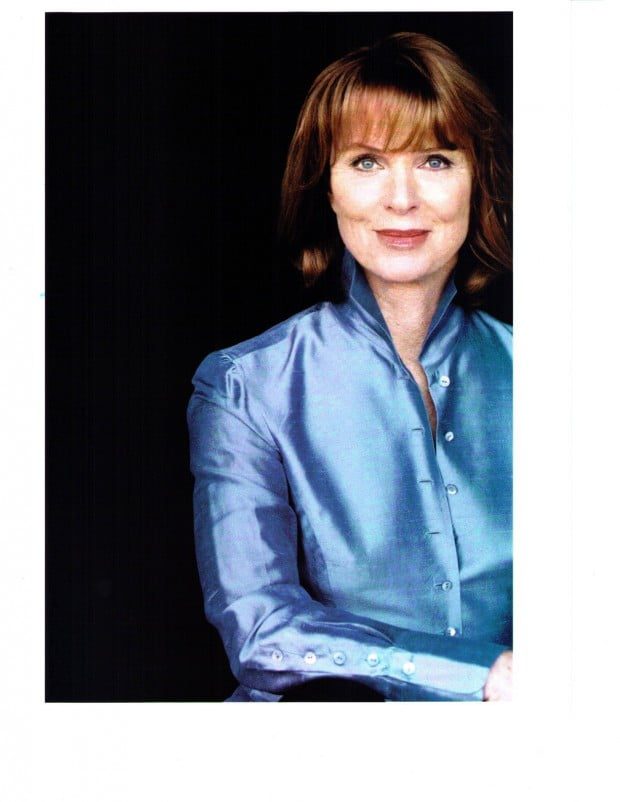When actress Mariette Hartley spoke recently at the Malibu Film Society about her work in director Sam Peckinpah’s classic film, “Ride the High Country,” she represented not just a lifetime of award-winning performances, but the end of an era. She was one of the last young performers chosen by MGM Studios to be groomed for movie stardom in the early 1960s.
“Ride the High Country” (1962) was notable in being the last film appearance of western movie star Randolph Scott and the first film of Peckinpah’s in which he had total script control. Much of the film was shot at the 20th Century Fox Movie Ranch in Malibu Creek State Park.
Hartley played a young woman trapped under the thumb of a cruel, abusive father and she snagged a BAFTA Award Nomination for Most Promising Newcomer for a role of understated complexity not usually seen in westerns. She said one of the thrills of working on the movie was witnessing the last work of two old western film stars (Scott and Joel McCrea) performing in the twilight of the genre.
“I had a wonderful moment when Joel’s character is dying where he falls, like a giant old dinosaur, and I looked over at Randy,” Hartley said. “He was crying. And I realized that it was a time when all those old greats were dying, like (Clark) Gable and (Gary) Cooper. I’m sure that was part of Randy’s emotion and he never did another film after that.”
Hartley spoke of the “emotionally violent” nature of her relationship in the film with her character’s father and described the story arc as almost Greek.
“Here is this innocent that leads these lambs to slaughter,” Hartley said. “These two old cowboys come out of retirement to deal with a moral dilemma. The movie holds up 50 years later.”
Hartley was unusually poised to plumb such emotional territory. Her grandfather was the internationally renowned psychologist John B. Watson, who founded an approach to psychology and child rearing that advocated “training” children without kissing, touching or nurturing them.
Her younger years were marred by the suicides of her father, an uncle and a cousin. She has spoken publicly about her struggle with psychological problems and attributes much of her family’s dysfunction to her grandfather’s practical application of his behavioral theories.
“Dad was a bi-polar alcoholic,” Hartley said. “We didn’t talk about such things when I was young. But I found a theatre group and it gave me expression. Theatre saved my life. That and a lot of therapy.”
Theatre also allowed her to create a broad resumé of theatrical roles (Shaw, Shakespeare, Chekhov) that led to decades of film and television appearances (she won an Emmy for her performance in the 1970s television version of “The Incredible Hulk”).
In 1990 she wrote (with Anne Commire) an autobiography, “Breaking the Silence,” which details the psychological challenges of her life. It was a best seller and from that, she wrote a one-woman show, “If You Get to Bethlehem, You’ve Gone Too Far.”
“My mother didn’t really support my coming out of the shadows with my book,” Hartley said. “She was afraid. But she contributed to it. And I’ve done a lot of speaking about it, because the only way to overcome such darkness is by shining light on it.”
Such insight is contributing mightily to her current project, slated to open at the Colony Theatre in Burbank this week, “The Morini Strad,” by Willy Holtzman. The play concerns the true-life story of the famous violinist Erica Morini after she damages her priceless Stradivarius, an instrument she had played since girlhood. She hires a violinmaker to restore her “Strad” in secret and the two develop a contentious and unexpected friendship.
Hartley said the piece was a welcome challenge.
“At my age, 65 pages of dialogue stretches the old grey matter,” she said. “But the role really comes to me at the right time. So much of what Erica has experienced is familiar to me. Everything she talks about, I’ve done, and, hopefully, I can bring her artistry and wisdom to this performance.”
The show’s director, Stephanie Vlahos, is herself from the world of classical music. The graduate of Yale University and the Juilliard School has performed with the L.A. Opera and is known as the “moonlighting diva” around the country.
“Mariette brings a number of remarkable qualities to this performance,” Vlahos said. “She brings a gravitas. My first voice teacher was a Viennese opera diva. Mariette has that same presence.”
Hartley relishes the emotional tug of the role.
“You get to that point in theatre where you have to say to yourself, ‘I have that kind of passion and I must trust it,’” Hartley said. “Sometimes, theatre is the only way you can express yourself.”
“The Morini Strad” runs Nov. 14-Dec. 16 at the Colony Theatre. Tickets and information may be found at http://colonytheatre.org/main.html.

